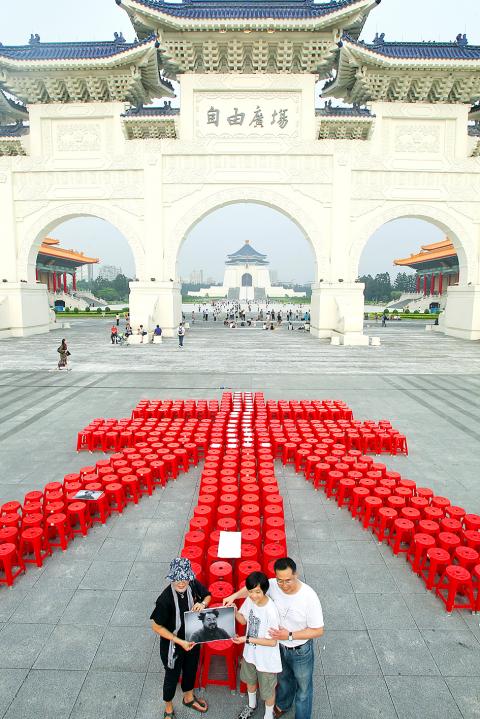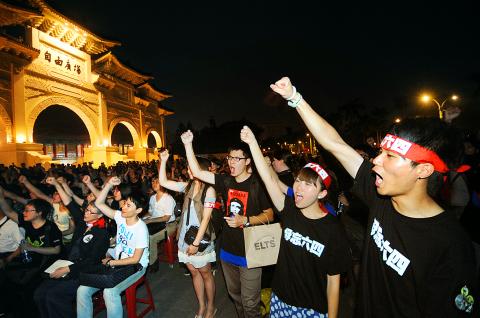Hundreds of college students assembled in Taipei last night to mark the 22nd anniversary of China’s Tiananmen Square Massacre, joining the candlelit vigils held in Hong Kong and Macau to honor the victims of the bloody crackdown and call for a spotlight on Chinese rights abuses.
Speaking at the event at Liberty Square, Wang Dan (王丹), a student leader of the 1989 pro-democracy movement, said the problems facing China today, including corruption, high unemployment, unequal distribution of wealth and moral failings, were a result of the crackdown on the movement.
“The crackdown snuffed out an opportunity” for China to peacefully transform into a democracy, he said.

Photo: Wang Wen-lin, Taipei Times
What the students appealed for would have been proven right had the crackdown not happened, as they had pointed out that China needed not only economic reform but also political reform, Wang said.
“Today, we are here to commemorate victims, to condemn killers and to boost survivors. The way to democracy is bumpy and it’s a very long way. It is because the sky is dark that we need to head toward the light. It is because the road is long that we must continue to move ahead,” he said.
The event was mainly initiated by two National Taiwan University (NTU) students from Hong Kong, along with Taiwanese students from National Tsing Hua University (NTHU), National Chengchi University (NCCU) and Soochow University, who formed a task force of Taiwanese students to promote democracy in China.

Photo: Fang Pin-chao, Taipei Times
“Candlelit vigils have been staged in Victoria Park in Hong Kong every year for the past 22 years, but it is rarely seen in Taiwan. We hope that friends in Taiwan do not forget the history,” said Fan Tsun-long (樊俊朗), an NTU student from Hong Kong.
China today poses a bigger threat than it did 22 years ago and its growing economic clout could negatively influence democratic development in Taiwan as it has already done in Hong Kong, he said.
Seaman Wong (黃俊傑), also an NTU student from Hong Kong, said the reason Taiwan must pay attention to the issue was simple — to pursue democracy, freedom and human rights, all universal values.
“Young Taiwanese do not always bear in mind high ideals and lofty aims, but 22 years ago, there were young people who sacrificed their lives fighting for those values in China,” Wong said.
Wong, who has been studying history at NTU since 2009, said the relentless efforts made by the late democracy activist Szeto Wah (司徒華) to rehabilitate the 1989 pro-democracy movement was the major reason why Hong Kongers showed a higher level of concern for the incident.
Lin Chia-hsing (林家興), an NCCU student, said that he wished the vigil would be the start of the grouping of students in Taiwan, Hong Kong and Macau, not only on June 4, but also afterwards, to encourage students in China not to give up on pursuing democracy, freedom and human rights.
Wang, currently a visiting academic at NTHU, said he was happy to see Taiwanese students attending the vigil.
“With the deepening of democracy in Taiwan, the younger generation can understand that economic exchanges with China is not all they want. They also care about political reform in China,” he said.
Earlier yesterday at Liberty Square, Bei Ling (貝嶺), an exiled Chinese poet, staged an installation art, in which 1,001 empty chairs were placed to form the characters of detained Chinese artist Ai Weiwei’s (艾未未) name to urge Beijing to release him.
“The chairs are waiting for Ai Weiwei. The installation was to let the Chinese authorities know that Ai Weiwei has not been forgotten even though he has been arrested. We are waiting for his return,” Bei said.

Seventy percent of middle and elementary schools now conduct English classes entirely in English, the Ministry of Education said, as it encourages schools nationwide to adopt this practice Minister of Education (MOE) Cheng Ying-yao (鄭英耀) is scheduled to present a report on the government’s bilingual education policy to the Legislative Yuan’s Education and Culture Committee today. The report would outline strategies aimed at expanding access to education, reducing regional disparities and improving talent cultivation. Implementation of bilingual education policies has varied across local governments, occasionally drawing public criticism. For example, some schools have required teachers of non-English subjects to pass English proficiency

‘FORM OF PROTEST’: The German Institute Taipei said it was ‘shocked’ to see Nazi symbolism used in connection with political aims as it condemned the incident Sung Chien-liang (宋建樑), who led efforts to recall Democratic Progressive Party (DPP) Legislator Lee Kun-cheng (李坤城), was released on bail of NT$80,000 yesterday amid an outcry over a Nazi armband he wore to questioning the night before. Sung arrived at the New Taipei City District Prosecutors’ Office for questioning in a recall petition forgery case on Tuesday night wearing a red armband bearing a swastika, carrying a copy of Adolf Hitler’s Mein Kampf and giving a Nazi salute. Sung left the building at 1:15am without the armband and apparently covering the book with a coat. This is a serious international scandal and Chinese

TRADE: The premier pledged safeguards on ‘Made in Taiwan’ labeling, anti-dumping measures and stricter export controls to strengthen its position in trade talks Products labeled “made in Taiwan” must be genuinely made in Taiwan, Premier Cho Jung-tai (卓榮泰) said yesterday, vowing to enforce strict safeguards against “origin laundering” and initiate anti-dumping investigations to prevent China dumping its products in Taiwan. Cho made the remarks in a discussion session with representatives from industries in Kaohsiung. In response to the US government’s recent announcement of “reciprocal” tariffs on its trading partners, President William Lai (賴清德) and Cho last week began a series of consultations with industry leaders nationwide to gather feedback and address concerns. Taiwanese and US officials held a videoconference on Friday evening to discuss the

PERSONAL DATA: The implicated KMT members allegedly compiled their petitions by copying names from party lists without the consent of the people concerned Judicial authorities searched six locations yesterday and questioned six people, including one elderly Chinese Nationalist Party (KMT) member and five KMT Youth League associates, about alleged signature forgery and fraud relating to their recall efforts against two Democratic Progressive Party (DPP) legislators. After launching a probe into alleged signature forgery and related fraud in the KMT’s recall effort, prosecutors received a number of complaints, including about one petition that had 1,748 signatures of voters whose family members said they had already passed away, and also voters who said they did not approve the use of their name, Taipei Deputy Chief Prosecutor